Choosing to Float
How a caregiver walked through her husband’s cancer journey with hope and resilience.
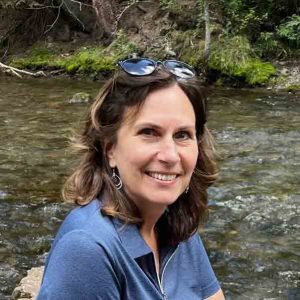
When my husband, Russ, was diagnosed with cancer, I wondered if I might be a widow at age 55.
Like a lot of caregivers, I had to live with a foot in both worlds: living as though he was going to live and making decisions as though he would die.
It was a tricky balance.
And yet I learned an approach that helped carry me through called, “choosing to float.”
Here’s my story.

Meeting Russ
I grew up in Glenwood Springs, Colorado, and met Russ, in my late 20s.
We were both working for a large Christian organization based in California, and one night at a social event, I thought maybe I should try to get him to ask me out. Well, it took him a few weeks, but eventually he did.
Our relationship continued to grow, even as we moved to different states and dated long-distance. Eventually we married and began building our lives together.
Here comes the hurricane
Fast forward a few decades and two kids later: we lived in Orlando, Florida, and a category three hurricane, Harvey, bared down on the city.
Russ is typically very energetic and prepared, yet before and after the storm, he just lacked his normal stamina.
I never considered that something could be wrong.

A bigger storm
A few days later, he saw a doctor who discovered his blood levels were critically low and he needed a transfusion. Eventually a hematologist said he probably had a precursor to leukemia.
But it was even worse than that.
About 10 days later, the doctor called and said Russ has acute myeloid leukemia, a type of cancer that affects the bone marrow and blood, and he should immediately check into the hospital. However, Russ being Russ, he insisted we wait until the morning.
So that’s what we did. After checking in, I asked the nurse: “How long is he going to be in here?”
I thought he would get some chemo and then go home in a few days.
“Oh, six weeks,” she said.
I felt numb and later my emotions caught up with reality.
Grief pours down
I had pictured growing old together with Russ, yet suddenly that vision was ripped apart. I began to wonder, is Russ going to die?
It all came to a head one morning while I was in the shower. Like the weight of the water cascading down on me, I felt the burden of the situation. I cried…not just gentle weeping but heaving sobs of grief. It was a temporary release from all the angst I was carrying.
Meanwhile, I was hit with a flurry of decisions that many caregivers face, including medical and financial.
We had been getting short paychecks because our ministry account ran out of funding. I wondered, “how are we going to pay for this?”
Communicating Russ’ health news with others also overwhelmed me. I had no idea how this was all going to turn out, and the stress and fear continued building.
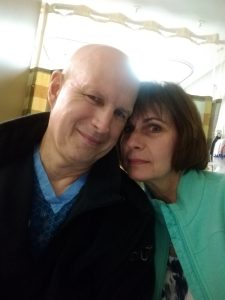
How I found hope, strength and peace
My relationship with God has long been a source of hope and strength for me. Knowing and trusting the Lord, even when we first learned of Russ’s diagnosis, gave me so much hope—that God had me, no matter what happened.
I had this sense of peace, that somehow, even if Russ died, God would still provide and take care of me.
That didn’t diminish my concern for Russ, and I sought to do whatever I could to help him survive.
Yet Russ and I made a decision that changed everything.
The turning point
We decided that we wanted God to be glorified through this experience, no matter where the journey led.
We decided that as a couple and also individually.
Many of our friends wanted to help and even visit Russ in the hospital. I was tempted to say no, but I felt like the Lord told me that I needed to receive. It was a posture of surrendering to God and letting others help us that transformed how I functioned as a caregiver.
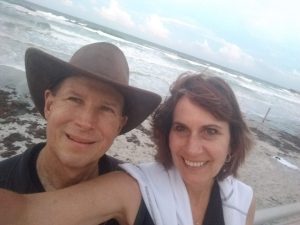
Choosing to float
I pictured it like this: being a caregiver of a spouse with cancer is like being swept into a massive river. In the beginning, you want to try to cling to the branches near the bank and save yourself, yet you are fighting the current.
I felt like the Lord was pushing me to let go and let him sweep me into the middle of the river—to choose to trust him and release control.
Unlike Russ, I, as the caregiver, chose to enter the river and float. It was scary and dangerous, because I didn’t know where the river was taking me, but once I let go and chose to trust him, God helped me float.
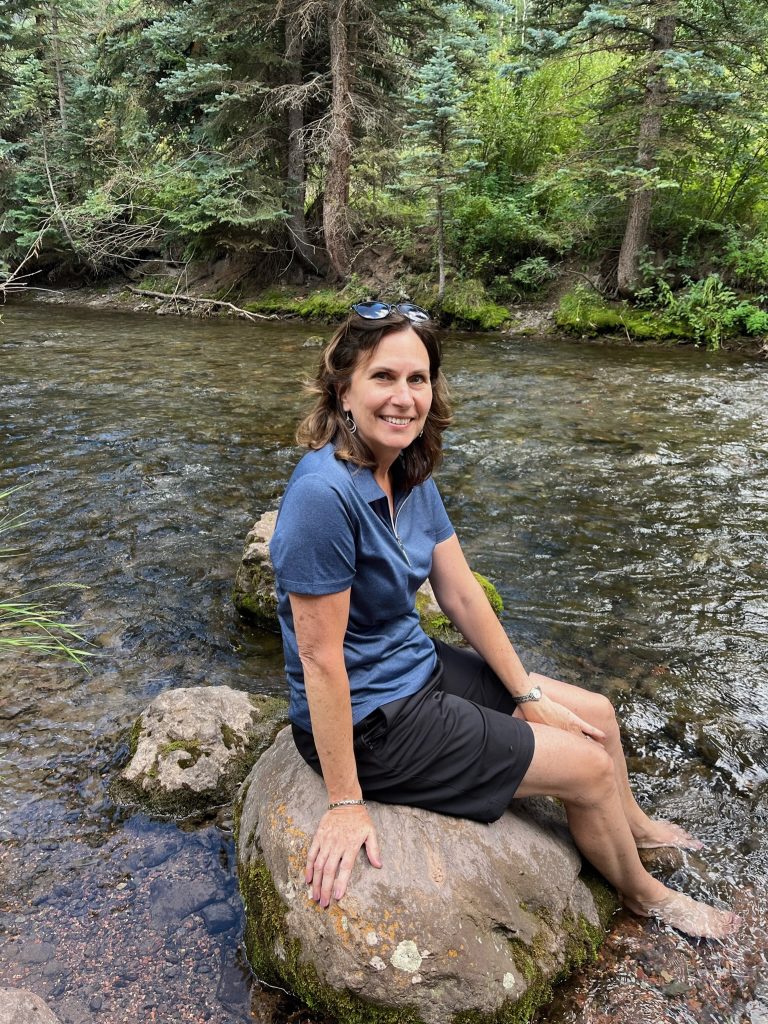
A supportive community
Choosing to float meant I was willing to receive help from whoever offered, and this was so encouraging, as a supportive community is a vital part of the healing process. You can also see Russ’s story, “An Impressive Circle of Friends” (see the link at the end of the story).
I also made the decision to be open and vulnerable about what we were going through by posting on Caring Bridge. From the beginning, I posted updates about Russ’s health and how I was doing. For example, on October 8, 2017, the day I cried in the shower, I wrote this simple post:
“Today was a hard day for me (Jo Anne) as the reality continues to sink in….that’s all I’ve got for today!”
It was terrifying to hit post every time, but I was so glad I did.
I found many benefits to being open. First, AML can be very lonely and isolating. When people saw my posts, they commented and prayed for us.
Many times, I felt like we weren’t alone, but friends were sitting with us, too. It became a lifeline.
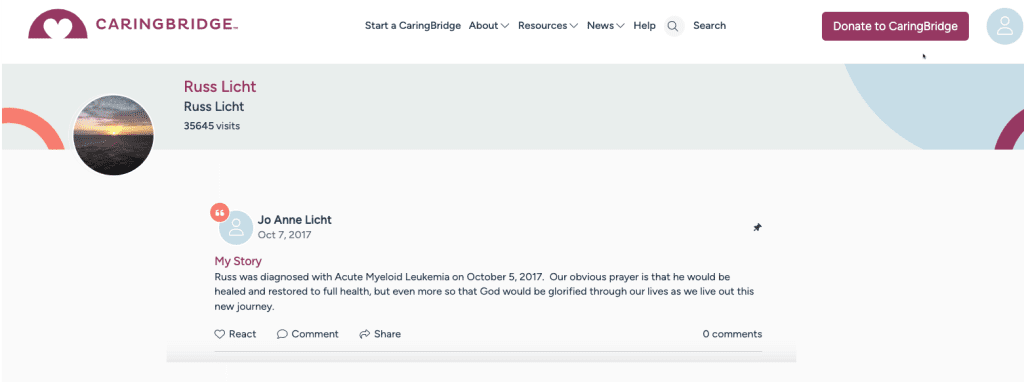
How I have changed
Often, we think that if we can just reach the end of something, everything will be better. Yet, it’s the process that is often so sweet.
This posture of choosing to float helped me receive from God and others. It helped carry us through all the twists and turns of AML—and there were many, including Russ’s bone marrow transplant and graph vs. host struggles.
Where is Russ is now
At times, it seemed like Russ might not survive, but amazingly he recovered. It’s now been seven years, and his medical team have even used the term “cured,” which is incredible.
Yet no matter where this journey takes us, I will continue to trust God and let him help me float.
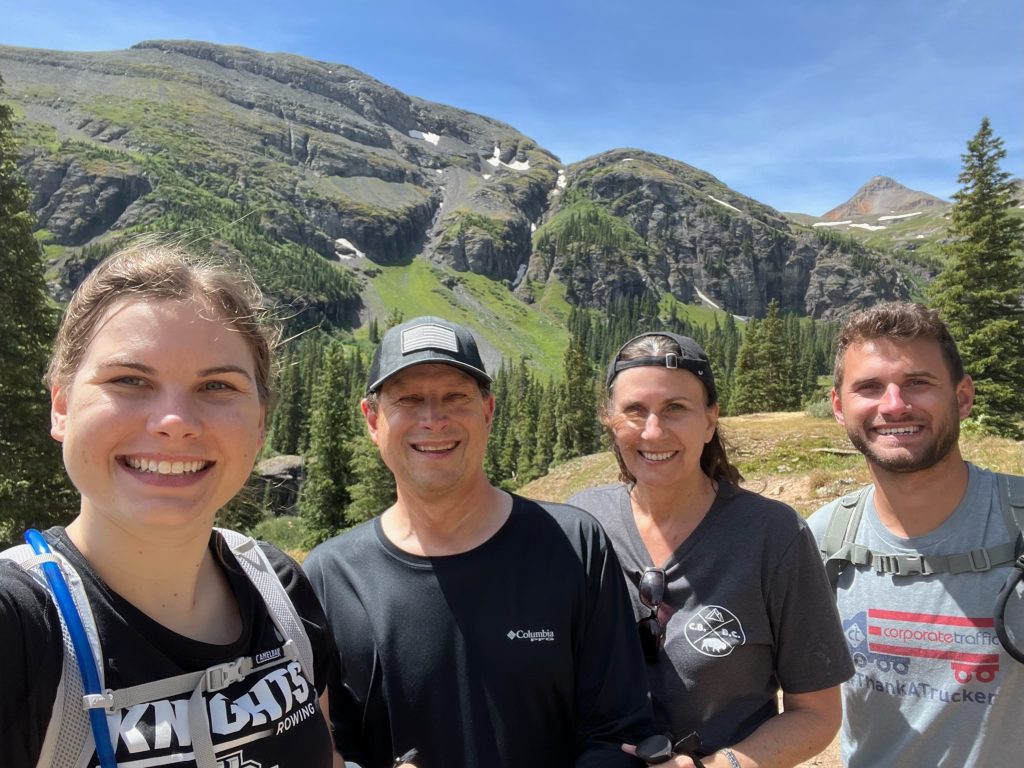
Advice for others
As a caregiver, you need to find some kind of normalcy. When Russ was in the hospital for six weeks, I went to the hospital during the day, returned home before rush hour, and walked the dog. These little routines proved so helpful.
Also, find a way to keep engaging with your community, whether in person or online.
When you come to the end of your own strength, you need to find another source of strength to draw upon.
I’m not sure how other caregivers or survivors go through this without God’s help.
If you don’t have a relationship with God, consider one. Let him care for you, and help you float. As you learn to trust him, he will give you hope and peace to carry you through wherever the journey takes you.
To find out more, read this article: Knowing God Personally.

